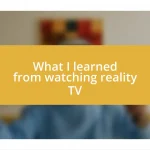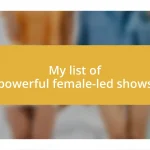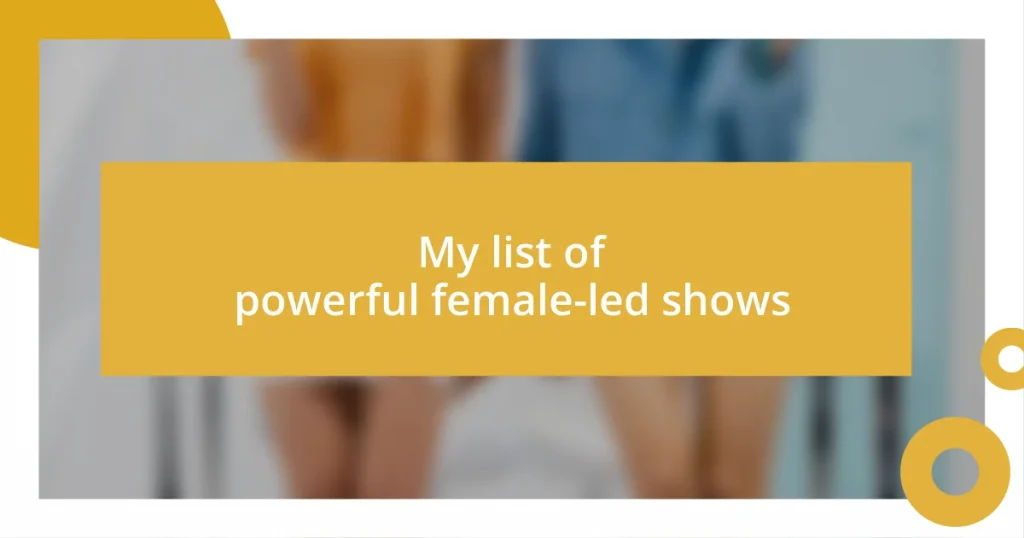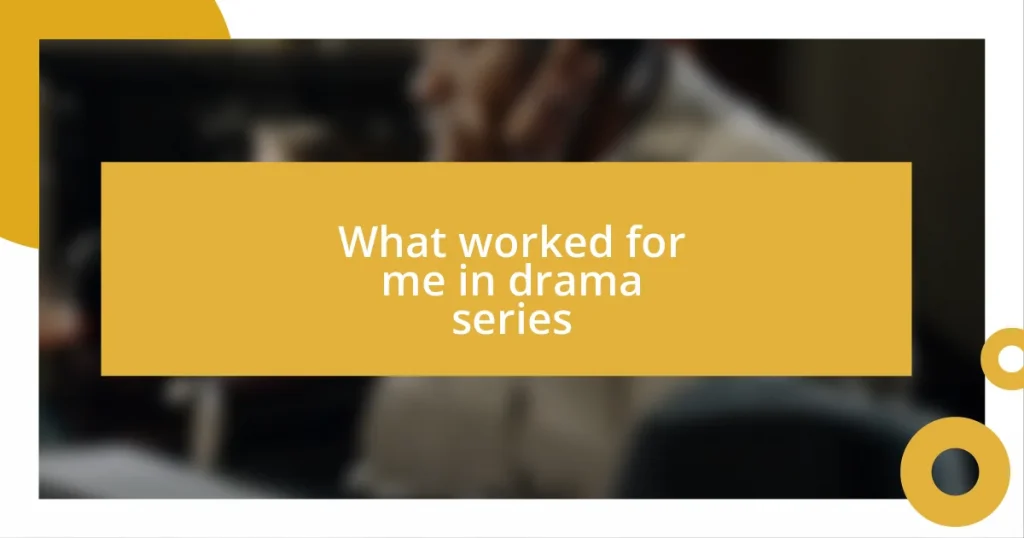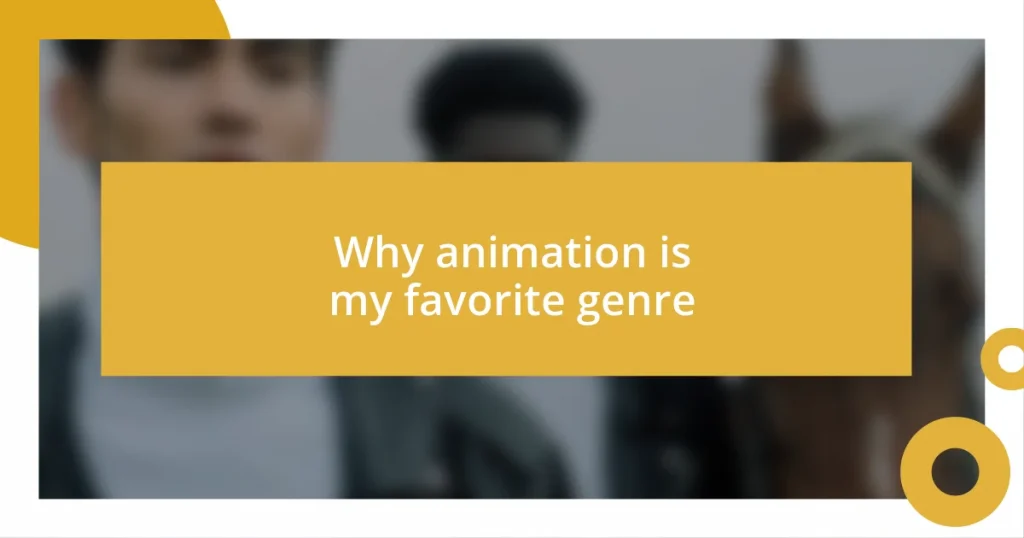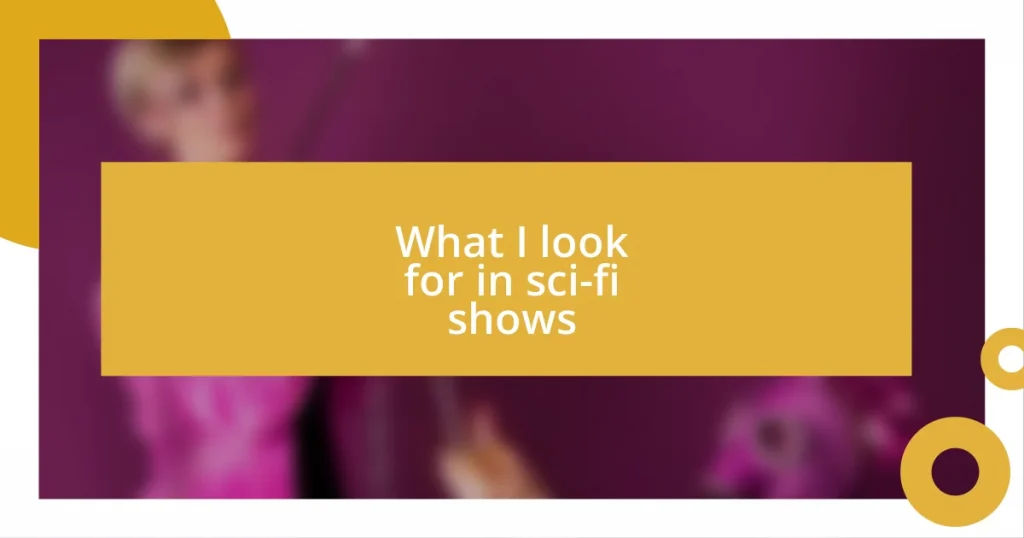Key takeaways:
- Female-led shows are gaining popularity, offering diverse narratives that empower women and challenge traditional portrayals.
- Representation in media is crucial for shaping societal perceptions, providing hope, and inspiring future generations of women.
- Supporting female-led content through viewership, sharing on social media, and subscribing to relevant platforms can significantly amplify women’s voices in the industry.
Overview of Female-Led Shows
Female-led shows have surged in popularity, showcasing the diverse narratives and powerful stories that come from women’s perspectives. Personally, I’ve found it refreshing to experience characters who are not just sidekicks or support but the central force driving the plot. Isn’t it incredible how these stories resonate deeply, often reflecting the real struggles and triumphs that women face every day?
I remember when I first watched a series featuring a strong, unapologetic female lead. It was as if the screen was lit up with new possibilities, reminding me of the strength and complexity women can embody. This powerful representation is crucial; it offers a mirror for young viewers, allowing them to envision themselves in roles historically reserved for men. How often do we see that kind of transformative vision in our storytelling?
Moreover, these shows often explore multifaceted themes like friendship, resilience, and self-discovery in ways that are both relatable and inspiring. I find myself drawn to the emotional journeys these characters undergo—whether they’re juggling career ambitions or navigating personal challenges. Is it any wonder that audiences are clamoring for more stories that feature women leading the charge?
Importance of Representation in Media
Representation in media plays a pivotal role in shaping societal perceptions and aspirations. When I think back to my own experiences, I can vividly recall the impact of seeing characters on screen who look like me, who face hurdles similar to my own. It’s a profound realization that media can empower or hinder, depending on how diverse those portrayals are.
In shows where women take center stage, we witness not just stories but powerful shifts in cultural narratives. I’ve often found myself in discussions with friends, reflecting on how relatable these characters are, navigating complexities that resonate with our daily lives. It’s refreshing to see women depicted as leaders, problem-solvers, and complex beings rather than defined by their relationships to men.
Ultimately, the importance of representation cannot be overstated. For me, these narratives provide hope and illustrate the vast possibilities available, fostering an environment where young girls can dream without limitations. It’s like opening a window to a world filled with opportunities. How can we expect to inspire future generations if they don’t see themselves represented in the stories that entertain and educate them?
| Aspects of Representation | Impacts on Society |
|---|---|
| Diverse Female Characters | Encourages empathy and understanding among audiences |
| Strong Female Leads | Inspires women to pursue leadership roles |
| Realistic Portrayals | Challenging stereotypes and reshaping norms |
Top Genres for Female-Led Shows
The landscape of female-led shows is rich with various genres, each bringing unique flavors to the table. I’ve noticed that drama often takes the lead, showcasing intricate character developments and emotional arcs. It really strikes a chord with me—there’s something deeply resonant about watching women confront personal and societal challenges. Other genres, like comedy, also shine brightly. They allow for humor to address serious issues, creating an engaging juxtaposition that I find particularly effective.
Here are some top genres that highlight powerful female leads:
- Drama: Explores complex emotions and relationships.
- Comedy: Uses humor to tackle important social issues.
- Thriller: Features strong, resourceful women in high-stakes scenarios.
- Fantasy/Sci-Fi: Presents imaginative worlds where women can be heroes and leaders.
- Documentary: Highlights real-life stories of inspiring women across various spheres.
I remember being captivated by a fantasy series where the female lead not only battled mythical creatures but also navigated the depths of her own identity. It was captivating to witness a narrative where a woman could both be fierce and vulnerable, reminding me that strength comes in many forms.
Groundbreaking Female Characters
When I think of groundbreaking female characters, a few immediately come to mind—those who redefine what it means to be strong and multifaceted. For instance, I was particularly drawn to a historical drama where the protagonist challenged societal norms, reminding me of women in my own life who have stood up against adversity. It’s inspiring how these characters can mirror real-life struggles, encouraging viewers to embrace their own power.
In another case, I recall watching a recent thriller series featuring a female lead who was not only resourceful but also deeply flawed. It struck me that her imperfections made her relatable; she wasn’t just a hero, but a real person with weaknesses. This complexity prompts a question: how often do we see male characters afforded such depth? That’s what makes these female characters groundbreaking; they break free from traditional molds, illustrating that vulnerability can coexist with strength.
Every time I encounter a character who embodies resilience, it feels like a personal victory, not just for her but for all women watching. I remember cheering for a character who, despite facing insurmountable odds, stood her ground, a powerful reminder that determination and tenacity can lead to profound change in both fiction and reality. It’s this emotional connection that solidifies their status as icons and instills hope in those who look to them for encouragement.
Notable Female Directors and Writers
I’m always amazed at the impact that female directors and writers can have on the medium. Take Ava DuVernay, for example, whose work on projects like “Queen Sugar” and “When They See Us” truly changed the conversation around representation in storytelling. I often wonder how her perspective as a black woman shapes the narratives we see, infusing them with authenticity and depth that’s often missing from mainstream media.
Then there’s Phoebe Waller-Bridge, whose unique voice in “Fleabag” resonates deeply with me. The wit and vulnerability she brings to the screen make the characters feel so incredibly real. Sometimes, I catch myself laughing and crying simultaneously at her writing, prompting me to reflect on my own life and relationships. Isn’t it fascinating how a well-crafted script can touch on universal truths, no matter the genre?
Lena Waithe also stands out as a powerhouse in the industry. Her work on “The Chi” has been a necessary exploration of community and identity. I remember watching a particular scene that highlighted the struggles of a queer character; it struck a chord with me, reminding me of the importance of telling stories that are often silenced. It’s not just about representation; it’s about creating spaces where every voice matters.
Impactful Storylines in Female-Led Shows
Exploring impactful storylines in female-led shows reveals the profound depth that comes from authentically representing women’s experiences. I remember binge-watching a series where the female lead wrestled with the pressures of balancing her career and family life. It hit home for me, reflecting my own challenges and making me question: how often do we see these intricate struggles portrayed so honestly? These kinds of stories resonate because they validate our feelings and remind us that other women share the same battles.
Then there are those powerful narratives that center around female friendships, showcasing the strength found in solidarity. One episode from a favorite show left me in tears as it depicted the unconditional support between two best friends during a crisis. It was a beautiful reminder of how vital these connections are in our lives. Isn’t it amazing how a well-crafted storyline can illuminate our realities, encouraging us to nurture our own friendships?
Moreover, I find it particularly compelling when shows address significant social issues through their female protagonists. Watching a series tackle topics like mental health or domestic violence with a female lead at the forefront made me reflect on the importance of these conversations in our society. It’s empowering to see characters who not only confront their own demons but also inspire change for others. I often think: if these stories can challenge the status quo and incite dialogue, how powerful can they truly be?
How to Support Female-Led Content
Supporting female-led content is incredibly important, and we can all play a part in elevating these voices. Start by seeking out and watching films and series created by women. I remember when I deliberately made an effort to discover films directed by women; it opened my eyes to a treasure trove of stories that I had previously overlooked. It’s amazing how much variety and richness these films can add to our viewing experience.
Another way to support is by sharing and promoting female-led content on social media. I often share trailers, articles, or thoughts about shows featuring female leads that have moved me. Just the other day, I posted about a powerful documentary directed by a woman, and I was thrilled to see my friends engaged in discussions afterward. It reminded me how one share can spread awareness and spark conversations that can ultimately lead to greater recognition and respect for female creators.
Lastly, consider subscribing to streaming services that prioritize female-centered stories or that actively support female filmmakers. I recently switched to a platform that highlights female filmmakers and their work, and it’s been a game-changer for discovering new content. Isn’t it exciting to think that our subscriptions can help fund and promote projects that uplift women’s voices in the industry?





